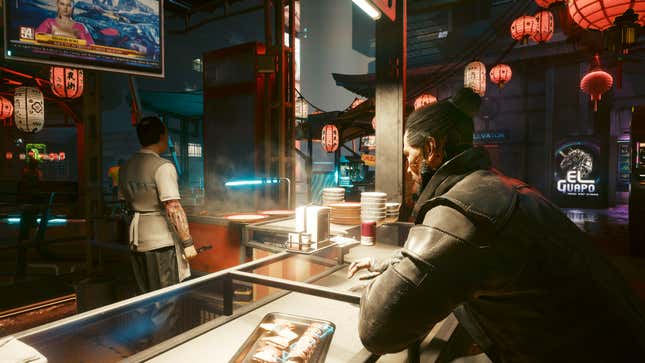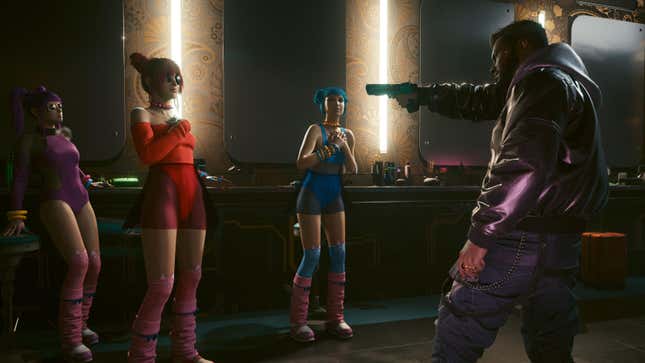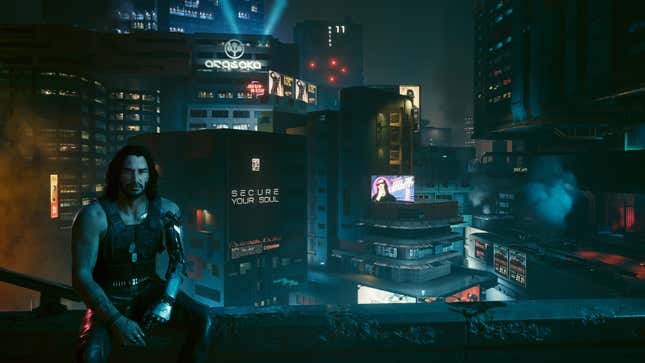Were it almost any other game from almost any other studio, Cyberpunk 2077's disastrous launch would have condemned it to the sales bins of history. Big AAA releases dropping with some bugs is one thing; big AAA releases being taken off the PlayStation Store because they were so broken is something else entirely.
Even then, though, in the depths of the game’s nadir, I could see something in the distance, past all the anger and frustration of the moment. So much of the negativity seemed to be coming not from a place of true revulsion, but disappointment, of people’s expectations of Cyberpunk 2077 being “The Witcher 3, with cars” being fumbled.
That spot on the horizon, as tiny as it was, nevertheless had shape and form. It was hope. Big games simply cannot be allowed to die, so even then, as Cyberpunk was on the receiving end of an unprecedented backlash, I could see where this story was headed. The world loves nothing more than a bad game’s redemption arc—see No Man’s Sky for a similar example of the genre—and as bad as Cyberpunk had been at release, surely CD Projekt Red, after spending all that time and money to make the game, would eventually spend enough time and money to fix it?

As time did its thing and moved ever onwards, that spot on the periphery would get bigger, until one day it would displace the negative vibes around the game entirely. One day, Cyberpunk 2077 would be good. Could be good. Please, Cyberpunk 2077, you could hear being said louder by the day, be good.
In late 2022, it looked like that moment had arrived. Alongside renewed interest in Cyberpunk 2077 in the wake of its excellent anime spin-off, the game won Steam’s ‘Labor of Love’ award—basically its “most improved” prize—with Valve recognising:
This game has been out for a while. The team is well past the debut of their creative baby, but being the good parents they are, these devs continue to nurture and support their creation. This game, to this day, is still getting new content after all these years.
We were now free, two years after the game’s nightmarish release, to convince ourselves that this was no longer the same game it had been at launch. Two years of work had righted the ship, given people what they wanted. Cyberpunk 2077 was good now.
But was it? I, along with most of you, had played it in 2020 and thought it was terrible. How much could really have changed since then? With a bunch of time to kill on a recent vacation, and to address my own simmering curiosity over the shape the game was in, I spent a few weeks working my way through Cyberpunk 2077, front to back.
IS CYBERPUNK 2077 GOOD NOW?
That’s a complicated question! But it’s why we’re here, now, in March 2023. What I found was that yes, over the past two years and change a bunch of technical improvements have been made. And when I say improvements, I say it like a battlefield medic would, in that “sawing a man’s legs off” is an improvement over “dying”. My first encounter with the game in December 2020 had lasted for around 10 hours, and for that entire time, even with a relatively new PC, Cyberpunk 2077 ran like trash. So bad it was distracting me from the game itself.
Now it runs great. With DLSS working its black magic and a bunch of patches under its belt, Cyberpunk 2077 is a game reborn on my PC—the exact same PC I had played it on in 2020—with even my modest rig able to run it in 4K, ray-tracing enabled, without skipping a beat. A smoother framerate also made the game’s sluggish shooting and driving sections slightly more tolerable, and best of all everything looked fantastic. So far, so good.
Cyberpunk’s countless and often mission-breaking bugs also seemed far less frequent. There are some still there, ones I think are just part of the way the game was built, like how cars don’t appear in the world so much as they’re dropped, still rocking on their suspension as your character first spots them. Or how police chases simply do not work. Pedestrians still walk and stand through one another, like they’re re-enacting the end of Watchmen. But there are a lot less of these, and I didn’t run into any of the formerly huge issues—like cars and bikes catapulting off the screen—so again, progress.
If bugs and weird glitches were your primary hangup, then sure, Cyberpunk 2077 is “good now”. This technical triage didn’t really matter to me, though. I’m a Battlefield 2042 veteran, I am used to finding pleasure amidst uncooperative polygons. What their taming did at least allow, though, was the opportunity to stop worrying about them, and focus on the game itself. Not what I had wanted it to be, or expected it to be in a post-Witcher 3 world, not what its calamitous launch had prevented it from seemingly ever being. Just me, a smooth framerate and the entirety of Cyberpunk 2077 ahead of me.
What follows is not a review. We did that already.
CYBERPUNK 2077, PART I
OK, I have SOME THINGS I need to say that will sound review-like. I played through 85 hours of Cyberpunk 2077, much of it over my vacation, I need to talk about this with someone.
I started this whole endeavour thinking I’d be writing about one game, Cyberpunk 2077, but I ended up playing two very different ones over those hours. So different, in fact, that I’ve had to basically write this whole piece twice, since so much of my first draft would eventually end up in the bin.
The first Cyberpunk 2077 I played was how I imagine—actually, how I know after looking at Steam achievement statistics showing how few players had completed important sidequests—most people’s time with the game went. You aren’t led through the main storyline so much as you’re shoved, bombarded from the outset with urgent phonecalls, frantic messages, cutscenes where you’re coughing up blood, directions to travel here, have a shootout there, and before you know it you’re at the endgame wondering why you’ve barely scratched the surface of Cyberpunk’s world, cast or myriad of RPG systems.
Writing about this Cyberpunk as I went, my notes used the word “dogshit” a lot. The main storyline is the very worst of Cyberpunk. It doubles down on the game’s failed attempts to be an explosive FPS, shines its brightest lights on Night City’s dullest characters and moves so fast that Cyberpunk’s elaborate endings mean nothing because you haven’t had the time or space to give a shit about anyone affected.
My conclusion to this piece, as the credits rolled, was that Cyberpunk 2077 was unsalvageable. Its problems were too fundamental, the scathing reviews from 2020 justified in their damnation.

CYBERPUNK 2077, PART II
But then something weird happened. Instead of being dumped back at my lair in some kind of overpowered postgame, I found myself reloaded back to a checkpoint just before the final mission. There was no real endgame here (the storylines as they wrap up rule that out), just a soft reboot, presumably so players could jump straight back into those final hours and make different choices, enough to unlock one of the game’s four other endings.
Here, with the main quests all but resolved and my need to see a final cutscene already satisfied, another Cyberpunk 2077 unfurled in front of me. This Cyberpunk was full of unresolved sidequests, only now I had the time and space to resolve them. The game finally had time to breathe. It took its foot off the gas, stopped harassing me to sort out Keanu Reeves’ problems and began slowly serving me the game’s most memorable quests, most with meaningful consequence, each one taking me on a tour of previously-unseen corners of the game’s lavish world and giving me a newfound appreciation for its scale and detail.
I met all my favourite Night City residents in this second Cyberpunk, and I think it’s easily the best way to meet them. To be able to savour each little adventure at its own pace, instead of having them crammed in between main quests. In this second game, where I was no longer following a Keanu Reeves-led narrative laced with international intrigue but free to just be a guy doing murderous odd jobs around town, Cyberpunk felt so much closer to what I had expected from it back in 2020. A game about exploration, being a handyman, uncovering unforgettable little stories with sticky moral quandaries. The Witcher 3 with cars, basically.
My conclusion after this second Cyberpunk wrapped, after I’d rinsed it of every substantial (and less so) sidequest on the board, is...well, it’s what you’re reading now. My reflections of a game that is still broken in so many ways, and forgettable in many others, but which is also more than that, so much more than most people who (rightfully and understandably!) bounced off the main storyline in 2020 and never looked back will ever know.
It’s almost as though Cyberpunk’s main problem isnt with its various components themselves, so much as the urgency and order they’re thrown at you. Playing Cyberpunk 2077 as CD Projekt Red designed it is like going to a fancy restaurant and having the steak thrown at your face before you’ve even looked at the menu. Then getting your delicious entrée served 90 minutes later. The food is good, sure! But that wasn’t the best way to eat it.
Everyone who has ever said “just try the side missions, they’re better” in the time since Cyberpunk 2077's launch, and sounded like a copium addict at the height of a trip, turned out to be right on the money. I’m sorry for ever doubting you. Some of these auxiliary quests are good, but many of them are excellent. A mayoral candidate having a little IT problem is a highlight, as is the tragic and unforgettable case of a cop’s missing nephew and a cattle farm. Claire’s tale of loss and revenge is handled with the utmost care. Judy’s evolution from peripheral quest-giver to her beautiful finale was a joy to play through, and Kerry’s mid-life crisis resolves in possibly the most cathartic moment of the whole game. These stories are well-written, deeply interesting and many of the best ones don’t even need you to shoot anything.
I could go on and on here, and kinda want to, but I’ve wasted enough of your time with my thoughts on a game that’s now over two years old, and was written about, at length, maybe more than any other video game in history. Thank you for sticking with me this long.
IT’S STILL CYBERPUNK 2077
Technical fixes aside—and they make a difference!—this is still Cyberpunk 2077. The good stuff was good in 2020, the bad stuff was bad in 2020, and they will forever be that way because you can’t save a game by patching in a new character arc (or any character arc) for Johnny Silverhand, or turn some dials and suddenly make the entire first-person shooting experience feel even remotely exciting.
I feel like I did everything I was supposed to do here, everything the zeitgeist and the blip on the horizon said I should do when it came to this game. I played it in 2020, bounced, then gave it time—time it may not have deserved if it was any other game from any other studio—to clean itself up. I revisited it to play the game this was supposed to be.
It’s not that game, of course. The “Cyberpunk can be saved” narrative is as delusional here as it is for so many other big-budget failures, when success had seemed assured but for whatever reason never arrived (of course Cyberpunk 2077 will always be, if nothing else, a financial success). Bugs and fundamental shortcomings in the game’s structure are two very different things. One can be patched, and mostly has been. The other, we’re stuck with forever.

And that’s OK? I’m OK with it, at least. There was so much anger and frustration tangled up in this game’s launch, all fed as much on people’s expectations as much as the reality of the game that was on offer before us. This was the next game from The Witcher 3 guys, it cost so much money to make, it took so long to make, it released so many incredible (and, turns out, quite fanciful) trailers, blah blah blah.
All this led to a consensus that the game was both busted and a huge disappointment. Now? Now it’s still a little busted and still disappointing in most of the same ways. There are still huge holes in this game, with shortcomings it will never overcome, but decoupled from the Bad Vibes of its 2020 launch I found myself free in 2023 to just fire up Cyberpunk 2077 and play what was in front of me.
What I found was a game that, when given the chance, could be more than just a trainwreck of a launch. It could also, with a bit of work and a bit more patience, be something truly special. And that was enough of a redemption arc for me.





